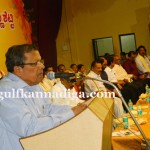Ashwini Y S, Mysore, Sept 15, 2013: The power-starved State may be subjected to further outages in the coming years as a substantial chunk of the water used to produce electricity from the oldest reservoir in the State, Linganamakki (across River Sharavathi), is likely to be diverted to supply drinking water to the Bayaluseeme regions (plains) of the State.
The Technical Feasibility Committee to study the Paramashivaiah committee report, constituted by the Congress government recently, is exploring the possibility of tapping into the west-flowing river Sharavathi, which takes its birth in the Western Ghats.
The controversial Paramashivaiah report has recommended the diversion of the west-flowing river Netravathi for the provision of drinking water to the drought-hit districts of Chikkaballapur, Kolar, Tumkur and others through the Yettinahole project.
The committee, comprising engineering, irrigation and environment experts, also has Paramashivaiah, retired chief engineer, as a member.
Given the many practical difficulties in implementing the Yettinahole project and the subsequent damage that may be caused to the fragile ecology of the Western Ghats, the members are exploring other “less impacting” options to address the drinking water problem.
Diverted for drinking
V S Prakash, Director, Karnataka State Natural Disasters Monitoring Centre, told Deccan Herald that about 20 to 30 tmc ft, out of the 150 tmc ft of the Sharavathi river water utilised for power generation, could be diverted for providing drinking water to the water-starved districts, including Bangalore.
In fact, the high level committee, headed by H N Thyagaraj, former chief engineer of BWSSB, has put forward a similar proposal to meet the water demands of Bangalore city.
“The committee is exploring other alternative sources so as to reduce the degree of damage that is caused while implementing such projects. By diverting the Sharavathi river water, the State will have to compromise on its power requirements. But the water concerns are grave and some tough stands have to be taken. The technology required for the Yettinahole project is highly challenging. We need to look at least damaging methods,” he said.
Noted environmentalist A N Yellappa Reddy, who is one of the members of the committee, said that there was a need to look at alternatives.
“I have been opposed to the Yettinahole project, because of the impact it can have on the Western Ghats. Diverting the Sharavathi river water has emerged as a suggestion from the engineers. This needs to be examined and the committee will require to make spot visits to study the topography and geographical features of the river. The source of tapping the river water is yet to be decided. Since the altitude of Sharavathi is higher than Netravathi, it has been felt that this will be a more feasible proposal,” he said.
Reddy said creating tunnels and lifting water through the reserve forests where Netravathi flows was improbable.
Silent revolution
Prakash said that the government could also explore other options like “banning the cultivation of sugar cane and paddy in the Cauvery basin temporarily.”
“Water utilised for growing sugar cane in one acre can suffice the drinking water needs of 1,000 people of one village for an entire year. When Karnataka was reeling under drought for four consecutive years during S M Krishna’s tenure as chief minister, the weirs and minor irrigation tanks were closed using cement to stop the cultivation of paddy and sugar cane. A silent revolution took place and we had addressed a severe drought situation that time,” he said.
Creating divide
Journalist and environment campaigner, Nagesh Hegde, said that successive governments had politicised this issue.
“Attempts at votebank politics have not only created a fear among the people about the scarcity of water, it has also led to a divide between the coastal and Malnad districts, and the plain lands. Politicians are known to create an extreme scare of scarcity, when it comes to water, so that they can bag large contracts. There is no need to take up projects like Yettinahole. In fact small groups in Chikkaballapur district have themselves voiced that this proposal is a fallacy,” he said. Hegde said recycling water is the need of the hour.


